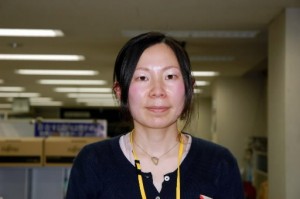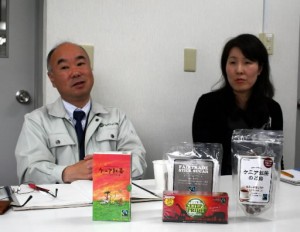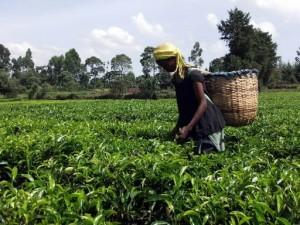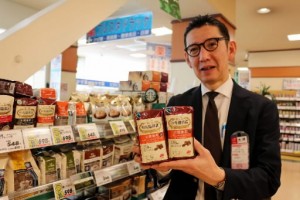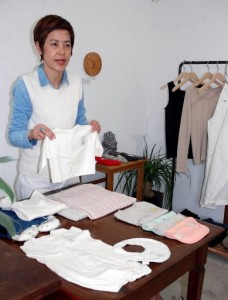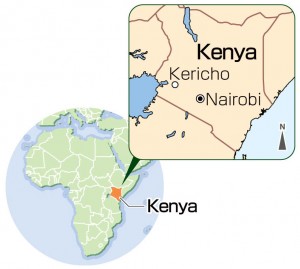Peace Seeds: Teens in Hiroshima Sow Seeds of Peace (Part 43)
Apr. 20, 2017
Part 43: Fair trade has a positive impact on the world
Lately, the expression “fair trade” has become more widely heard in Japan. This refers to a system of trade where food products and other goods produced in developing countries are sold at a reasonable price without seeking to hold down the price points for these items. The goal is to help workers in these nations live independent lives and avoid the disparity, poverty, and environmental destruction that has resulted from mass production, which makes efficiency a higher priority.
In fact, fair trade products are handled by more companies, supermarkets, and shops in the Chugoku Region of Japan than we expected. There are various reasons for this, with some wanting to make a contribution to society by lending their support to the people of developing countries and others seeing the appeal of these handmade products. For this article, the junior writers have considered how junior high and high school students can lend a hand, too, as we thought of the people who work to produce these goods.
“The small choice of what we consume can have an impact on the world”
The idea of fair trade began growing in awareness about 30 years ago, promoted by international non-governmental organizations (NGOs). Starting about 10 years ago, this issue became a topic of conversation in Japan, too.
Products made in developing nations generally move through a process of many steps, including export, import, processing, and wholesaling, before they are sold at shops in developed countries. If the people involved at each step along the way sought to obtain these goods at lower prices, this would mean that the producers themselves would have to curb their costs. Then the wages of the workers at these production sites would fall. Fair trade is designed to revamp this system of trade in a fundamental way and help create a world where people who suffer in conditions of poverty will be better able to lead independent lives.
Some of the goods bought through fair trade channels have labels printed on them which indicate that they have been certified by certain international groups. The labels show that the products comply with fair trade standards: they have been produced or processed under safe labor conditions without relying on child labor; they have been purchased above a certain price at all times; and the use of agrochemicals has been minimized.
When the topic is fair trade, we tend to think of things like coffee, chocolate, bananas, and cotton products. According to Asami Ogura, 35, an assistant professor at the Institute for Peace Science at Hiroshima University, fair trade is connected to the history of places that were once European colonies. It can be traced back to the fact that the European rulers ran plantations and made large fortunes by exporting such products. More recently, there is rising support to convert these plantations into fields so that the local people are able to grow staple crops to sustain their own lives and livelihoods.
The retail prices of fair trade goods are inevitably high, yet they still amounted to less than 10 billion yen in sales in the Japanese marketplace in 2014. Ms. Ogura said, “Shopping is similar to voting. Even the small choice of what we consume can have an impact on the world.” With the allowance that they receive, even junior high and high school students could buy fair trade goods. (Chiaki Yamada, 17)
Labotec in Saeki Ward imports and sells Kenyan tea
Labotec Co., Ltd., a company located in Saeki Ward, Hiroshima Prefecture, tests the quality of water and air and develops equipment for this purpose. Surprisingly, one section of the company also imports and sells fair trade tea from Kenya.
Because a board member had a connection to Kenya, the company decided to start importing tea in 2009 with the hope that this business arrangement could lend some support to the lives of the local people there. Last year, Toshiko Yamahiro, 42, and her boss, Hiroshi Yamada, 49, who are in charge of these imports, traveled to Kericho, the place in Kenya where the tea is produced. They observed people picking tea leaves and they toured a processing plant, checking the current state of production and quality control.
The tea Ms. Yamahiro made for us was a surprise: It was very fragrant and had a rich flavor, without any additional flavoring. The company has asked a candy maker in Hyogo prefecture to produce the tea-infused cough drops. When the Kenyan tea was analyzed, it was found to contain a large quantity of catechin, which has antibacterial properties, and this led to the idea of marketing the tea in the form of cough drops.
The company has also experienced difficulties with their fair trade efforts. The boxes they receive are sometimes crushed and the tea powder has spilled out. The people of Kenya don’t seem to mind making use of tea in this state, but the company has persistently called for the tea producers to improve their methods to meet the needs of Japanese consumers. Also, the awareness of fair trade products in Japan is still relatively low and this hinders more robust sales.
The tea can be purchased online, at the Japanese Consumers’ Cooperative Union (JCCU) Hiroshima, and at school festivals, including Nagisa Koen Elementary School in Saeki Ward. There are two kinds of tea bags: one is for daily use, and the other is of higher quality. They are sold in packs of 25 for 300 yen, and packs of 15 for 600 yen, respectively, excluding tax. Ms. Yamahiro and Mr. Yamada said, “We want to extend the market for tea because sustaining this business can support the lives of the tea producers.” (Tokitsuna Kawagishi, 15, and Miki Meguro, 15)
Fresta in Nishi Ward sells organic coffee beans
Fresta, a supermarket chain headquartered in Nishi Ward, sells coffee beans produced in Ethiopia, a country in Africa, and in Guatemala, a country in Central America, at 54 shops in Hiroshima, Yamaguchi, and Okayama prefectures. A package weighing 170 grams costs about 700 yen. This price is about one and a half times as much as an ordinary product, but Kenji Hasebe, 41, the director of processed foods for the company, said, “Organically-grown coffee is also a high value-added product.”
Fresta began buying coffee beans in 2006 from Ogawa Coffee, located in Kyoto, because the two companies share a similar corporate vision for being “fair dealing” and “environmentally friendly.” Only about 5,000 packages of coffee beans are sold annually, but Isao Otsubo, a food buyer for Fresta, said, “We want to help support coffee producers in developing countries.”
Mr. Otsubo said that the company hopes to increase the number of fair trade products it offers, such as tea and chocolate. I think if supermarkets sell more fair trade goods, this will attract the attention of more people. Through fair trade, and the contributions made to society by businesses, our lives are becoming linked to developing nations. (Kana Okino, 16)
“Kurashi no Mise” in Higashihiroshima sells cotton goods
Recently, more shops are selling fashionable fair trade goods that are popular with women. One such shop is Kurashi no Mise (The Shop for Living), located in the city of Higashihiroshima, which carries People Tree products, including clothing for babies.
The Indian cotton has a pleasant feel and because the use of agrochemicals is limited, buyers feel more at ease. Chocolate is available only during the winter because it melts in hot weather. The use of natural materials is a characteristic of fair trade products.
Eiko Komi, 55, is the manager of the shop. “If you assume that fair trade is the same thing as fundraising for developing countries, you would be wrong,” she said. “Fair trade offers many excellent handmade products. If you feel satisfied with the quality and come to like these products, it helps the people of developing nations.” (Terumi Okada, 17)
Junior writers’ impressions
After the interview, I bought some Kenyan tea. When I received the package, inside was a letter from Ms. Yamahiro. She had kind words about our interview, and I felt glad that I had a chance to speak with her. Labotec seems like such a thoughtful company for handling fair trade products. Fair trade is built on trust between producers, sellers, and consumers, and building this trust is a long, hard process, but trust is also the basis for advancing peace in the world. (Tokitsuna Kawagishi, 15)
The interview with Fresta enabled me to become much more familiar with the issue of fair trade. When Professor Ogura from Hiroshima University spoke to us, we had a chance to try some chocolate and it tasted good, it was mildly sweet. Even though the chocolate is more expensive than other types, the packages are stylish and I’d like to buy them as gifts for special occasions. All the products I saw were so appealing and I hope people of various generations will buy them, not only to contribute to this social cause but also because they’re tasty and well designed. (Kana Okino, 16)
The fair trade chocolate we tried had a mild and pleasant taste, perhaps because it was free of additives. I had thought that fair trade products were only about supporting a social cause, but I discovered that they’re high-quality products and taste really good. I’d like to buy them not just because they’re fair trade products, but also because the quality is high. (Miki Meguro, 15)
What is Peace Seeds?
Peace Seeds are the seeds of smiles which can be spread around the world by thinking about peace and the preciousness of life from various viewpoints. To fill this world with flowering smiles, 27 junior writers, from the first year of junior high school to the third year of senior high school, choose themes, gather information, and write articles.
(Originally published on April 20, 2017)
Lately, the expression “fair trade” has become more widely heard in Japan. This refers to a system of trade where food products and other goods produced in developing countries are sold at a reasonable price without seeking to hold down the price points for these items. The goal is to help workers in these nations live independent lives and avoid the disparity, poverty, and environmental destruction that has resulted from mass production, which makes efficiency a higher priority.
In fact, fair trade products are handled by more companies, supermarkets, and shops in the Chugoku Region of Japan than we expected. There are various reasons for this, with some wanting to make a contribution to society by lending their support to the people of developing countries and others seeing the appeal of these handmade products. For this article, the junior writers have considered how junior high and high school students can lend a hand, too, as we thought of the people who work to produce these goods.
“The small choice of what we consume can have an impact on the world”
The idea of fair trade began growing in awareness about 30 years ago, promoted by international non-governmental organizations (NGOs). Starting about 10 years ago, this issue became a topic of conversation in Japan, too.
Products made in developing nations generally move through a process of many steps, including export, import, processing, and wholesaling, before they are sold at shops in developed countries. If the people involved at each step along the way sought to obtain these goods at lower prices, this would mean that the producers themselves would have to curb their costs. Then the wages of the workers at these production sites would fall. Fair trade is designed to revamp this system of trade in a fundamental way and help create a world where people who suffer in conditions of poverty will be better able to lead independent lives.
Some of the goods bought through fair trade channels have labels printed on them which indicate that they have been certified by certain international groups. The labels show that the products comply with fair trade standards: they have been produced or processed under safe labor conditions without relying on child labor; they have been purchased above a certain price at all times; and the use of agrochemicals has been minimized.
When the topic is fair trade, we tend to think of things like coffee, chocolate, bananas, and cotton products. According to Asami Ogura, 35, an assistant professor at the Institute for Peace Science at Hiroshima University, fair trade is connected to the history of places that were once European colonies. It can be traced back to the fact that the European rulers ran plantations and made large fortunes by exporting such products. More recently, there is rising support to convert these plantations into fields so that the local people are able to grow staple crops to sustain their own lives and livelihoods.
The retail prices of fair trade goods are inevitably high, yet they still amounted to less than 10 billion yen in sales in the Japanese marketplace in 2014. Ms. Ogura said, “Shopping is similar to voting. Even the small choice of what we consume can have an impact on the world.” With the allowance that they receive, even junior high and high school students could buy fair trade goods. (Chiaki Yamada, 17)
Labotec in Saeki Ward imports and sells Kenyan tea
Labotec Co., Ltd., a company located in Saeki Ward, Hiroshima Prefecture, tests the quality of water and air and develops equipment for this purpose. Surprisingly, one section of the company also imports and sells fair trade tea from Kenya.
Because a board member had a connection to Kenya, the company decided to start importing tea in 2009 with the hope that this business arrangement could lend some support to the lives of the local people there. Last year, Toshiko Yamahiro, 42, and her boss, Hiroshi Yamada, 49, who are in charge of these imports, traveled to Kericho, the place in Kenya where the tea is produced. They observed people picking tea leaves and they toured a processing plant, checking the current state of production and quality control.
The tea Ms. Yamahiro made for us was a surprise: It was very fragrant and had a rich flavor, without any additional flavoring. The company has asked a candy maker in Hyogo prefecture to produce the tea-infused cough drops. When the Kenyan tea was analyzed, it was found to contain a large quantity of catechin, which has antibacterial properties, and this led to the idea of marketing the tea in the form of cough drops.
The company has also experienced difficulties with their fair trade efforts. The boxes they receive are sometimes crushed and the tea powder has spilled out. The people of Kenya don’t seem to mind making use of tea in this state, but the company has persistently called for the tea producers to improve their methods to meet the needs of Japanese consumers. Also, the awareness of fair trade products in Japan is still relatively low and this hinders more robust sales.
The tea can be purchased online, at the Japanese Consumers’ Cooperative Union (JCCU) Hiroshima, and at school festivals, including Nagisa Koen Elementary School in Saeki Ward. There are two kinds of tea bags: one is for daily use, and the other is of higher quality. They are sold in packs of 25 for 300 yen, and packs of 15 for 600 yen, respectively, excluding tax. Ms. Yamahiro and Mr. Yamada said, “We want to extend the market for tea because sustaining this business can support the lives of the tea producers.” (Tokitsuna Kawagishi, 15, and Miki Meguro, 15)
Fresta in Nishi Ward sells organic coffee beans
Fresta, a supermarket chain headquartered in Nishi Ward, sells coffee beans produced in Ethiopia, a country in Africa, and in Guatemala, a country in Central America, at 54 shops in Hiroshima, Yamaguchi, and Okayama prefectures. A package weighing 170 grams costs about 700 yen. This price is about one and a half times as much as an ordinary product, but Kenji Hasebe, 41, the director of processed foods for the company, said, “Organically-grown coffee is also a high value-added product.”
Fresta began buying coffee beans in 2006 from Ogawa Coffee, located in Kyoto, because the two companies share a similar corporate vision for being “fair dealing” and “environmentally friendly.” Only about 5,000 packages of coffee beans are sold annually, but Isao Otsubo, a food buyer for Fresta, said, “We want to help support coffee producers in developing countries.”
Mr. Otsubo said that the company hopes to increase the number of fair trade products it offers, such as tea and chocolate. I think if supermarkets sell more fair trade goods, this will attract the attention of more people. Through fair trade, and the contributions made to society by businesses, our lives are becoming linked to developing nations. (Kana Okino, 16)
“Kurashi no Mise” in Higashihiroshima sells cotton goods
Recently, more shops are selling fashionable fair trade goods that are popular with women. One such shop is Kurashi no Mise (The Shop for Living), located in the city of Higashihiroshima, which carries People Tree products, including clothing for babies.
The Indian cotton has a pleasant feel and because the use of agrochemicals is limited, buyers feel more at ease. Chocolate is available only during the winter because it melts in hot weather. The use of natural materials is a characteristic of fair trade products.
Eiko Komi, 55, is the manager of the shop. “If you assume that fair trade is the same thing as fundraising for developing countries, you would be wrong,” she said. “Fair trade offers many excellent handmade products. If you feel satisfied with the quality and come to like these products, it helps the people of developing nations.” (Terumi Okada, 17)
Junior writers’ impressions
After the interview, I bought some Kenyan tea. When I received the package, inside was a letter from Ms. Yamahiro. She had kind words about our interview, and I felt glad that I had a chance to speak with her. Labotec seems like such a thoughtful company for handling fair trade products. Fair trade is built on trust between producers, sellers, and consumers, and building this trust is a long, hard process, but trust is also the basis for advancing peace in the world. (Tokitsuna Kawagishi, 15)
The interview with Fresta enabled me to become much more familiar with the issue of fair trade. When Professor Ogura from Hiroshima University spoke to us, we had a chance to try some chocolate and it tasted good, it was mildly sweet. Even though the chocolate is more expensive than other types, the packages are stylish and I’d like to buy them as gifts for special occasions. All the products I saw were so appealing and I hope people of various generations will buy them, not only to contribute to this social cause but also because they’re tasty and well designed. (Kana Okino, 16)
The fair trade chocolate we tried had a mild and pleasant taste, perhaps because it was free of additives. I had thought that fair trade products were only about supporting a social cause, but I discovered that they’re high-quality products and taste really good. I’d like to buy them not just because they’re fair trade products, but also because the quality is high. (Miki Meguro, 15)
What is Peace Seeds?
Peace Seeds are the seeds of smiles which can be spread around the world by thinking about peace and the preciousness of life from various viewpoints. To fill this world with flowering smiles, 27 junior writers, from the first year of junior high school to the third year of senior high school, choose themes, gather information, and write articles.
(Originally published on April 20, 2017)

